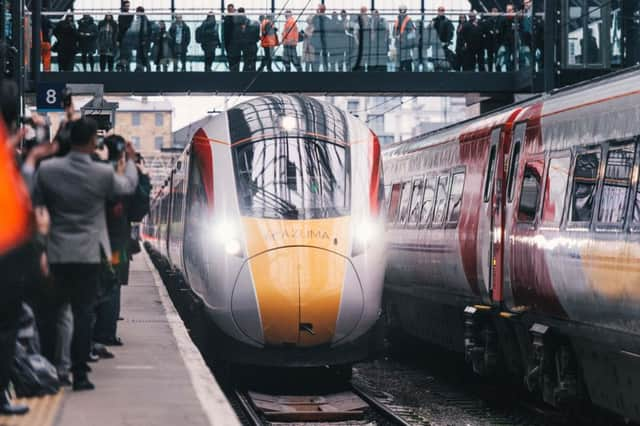Alastair Dalton: Learning to love train as much as plane


But on many flights, it’s now very different. Air travel has become tainted with security queues, passengers jostling for space, and having to pay extra for everything.
Virgin used to tap into the emotional attachment people have with aviation for travel between Scotland and London, which was not surprising because it operated flights between Edinburgh, Aberdeen and Heathrow.
Advertisement
Hide AdAdvertisement
Hide AdThe firm also ran - and still runs - trains between Glasgow and London, but whose advertising gave the impression they were virtually planes.
Slogans included “Fly Virgin Trains”, with shots of carriages appearing to speed above the clouds.
However, not only has Virgin since ditched those cross-Border flights, it now also runs trains between Edinburgh (and Aberdeen and Inverness) and London - and how things have changed.
Surprise, surprise, the company’s marketing has markedly changed tack. It’s now all about the downside of air travel, the “pain” of flying, and the rail alternative remedy as providing “instant plane relief”.
Virgin has backed this with a series of adverts featuring couples who prefer to “do it” (they actually mean travel) on a train rather than a car or plane.
However, there is serious intent behind such playful innuendo. The train operator has a lot of seats to fill, and with more to follow when a brand new fleet starts running on the east coast main line in two years time.
Virgin will also have even more capacity if it retains the west coast main line contract, which will include operating the first HS2 trains.
The company wants passengers to love long-distance train travel in the same way they have loved flying.
Advertisement
Hide AdAdvertisement
Hide AdIt has pioneered the use of a mobile device app to mimic an aircraft’s entertainment system, enabling everyone on board to stream films and TV shows free on their phones and tablets.
On the west coast, thoughtful menus in first class place the emphasis on the quality rather than quantity of complimentary food.
Virgin is also planning to address anomalies to attract more business travellers, such as such food being restricted to snacks at weekends.
Making my first Scotland-London rail journey for a decade, as a guest of Virgin, I found the ride smooth and quiet, the tilt round corners was barely noticeable, while station signs whizzed by so quickly they were illegible.
The ambience should be even better in the new Japanese-designed “Azuma” trains being built for the east coast main line, which promise as much legroom for everyone as afforded to those in the current priority seats for the elderly and disabled.
Virgin, along with its Stagecoach partners in both east and west coast franchises, is aiming high, with an ambitious target of making trains more popular than trains on the route within seven years.
It will need the extra passengers - increasing its share of the air/rail market from one third - to pay back to the UK Government its winning £3 billion bid for the franchise.
Increasing fondness for rail will also set the scene for the planned launch of HS2 in a decade’s time - by which time we’ll all need to love rail to provide the demand to make it work.